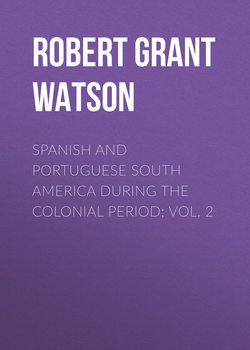Spanish and Portuguese South America during the Colonial Period; Vol. 2

Реклама. ООО «ЛитРес», ИНН: 7719571260.
Оглавление
Robert Grant Watson. Spanish and Portuguese South America during the Colonial Period; Vol. 2
CHAPTER I. BRAZIL; THE DUTCH WAR
CHAPTER II. BRAZIL; THE DUTCH WAR; GOVERNMENT OF THE COUNT OF NASSAU
CHAPTER III. BRAZIL; THE DUTCH WAR; RISING OF THE PORTUGUESE
CHAPTER IV. BRAZIL; CONCLUSION OF THE DUTCH WAR
CHAPTER V. BRAZIL; JESUIT MISSIONS IN NORTHERN BRAZIL
CHAPTER VI. BRAZIL; ESTABLISHMENT OF THE FRENCH IN SOUTH AMERICA
CHAPTER VII. BRAZIL; THE SEVENTEENTH CENTURY
CHAPTER VIII. PERU; PROGRESS OF THE VICEROYALTY
CHAPTER IX. VICEROYALTY OF NEW GRANADA; CAPTAIN-GENERALSHIP OF VENEZUELA
CHAPTER X. PROGRESS OF THE COLONY
CHAPTER XI. BRAZIL: DISCOVERY OF THE MINES; ATTEMPT OF THE FRENCH ON RIO DE JANEIRO
CHAPTER XII. BRAZIL: DISCOVERY OF THE DIAMOND DISTRICT
CHAPTER XIII. FOUNDATION AND PROGRESS OF BUENOS AYRES
CHAPTER XIV. BRAZIL; THE WAR OF THE SEVEN REDUCTIONS
CHAPTER XV. BRAZIL; EXPULSION OF THE JESUITS FROM PORTUGAL AND BRAZIL
CHAPTER XVI. PARAGUAY; EXPULSION OF THE JESUITS FROM BUENOS AYRES AND PARAGUAY
CHAPTER XVII. BRAZIL IN THE EIGHTEENTH CENTURY; ARRIVAL OF THE BRAGANZAS
CHAPTER XVIII. REPULSE OF GENERAL WHITELOCKE AT BUENOS AYRES
APPENDIX
I
II
Отрывок из книги
The Count of Nassau arrived in Brazil at a critical moment, for the Portuguese were so emboldened by success that even the road between Recife and Olinda was not safe, and the sugar-works, whose existence was of such vital importance, were placed in danger. The tenths of these were at this time farmed for no less a sum than two hundred and eighty thousand florins. Nassau distributed two thousand six hundred men among the garrisons; whilst he formed an army of three thousand, and assigned six hundred for predatory warfare. The stores had run so short that it was difficult to supply the garrisons and at the same time to provide the troops with provisions for a two months’ expedition. Dutchmen, like Englishmen, fight well when well fed, but grumble sadly when put on reduced rations. Such, however, was now their fate.
After a day of general prayer, Nassau began his march. The Dutch had advanced unmolested to within two leagues of Porto Calvo before the Portuguese were informed of their movements. A sally was then made, but without effect, and the same evening Nassau pitched his camp under the fort. The Portuguese general, Bagnuolo, had retreated during the night, and the Dutch could now communicate with their fleet at the mouth of the river of Pedras on which Porto Calvo is situated. After fifteen days, the fort, which had suffered greatly, surrendered on honourable terms, the garrison being promised a passage to the Spanish Indies. Bagnuolo retreated to the town of San Francisco, on the river of the same name. His force, however, was totally disorganized, and had lost all confidence in its general. Without waiting for the Dutch, he quitted this position and fell back on Seregipe.
.....
On the departure of the Viceroy from Brazil the government had fallen into the hands of a commission of three persons, who now sent Vilhena the Jesuit, with another, to Recife to establish a friendly intercourse between the two colonies. Vilhena took advantage of the opportunity to recover a considerable quantity of plate and other treasure, which had been buried by the brethren of his order and by the Albuquerques. Laden with this he sailed from Brazil in a small vessel, in which he duly reached Madeira. There, however, he became oppressed with the apprehension of trusting his wealth once more to the small ship which had carried him safely so far. It accordingly sailed without him, and duly reached its destination. He himself was not so fortunate. Thinking to provide himself the better against attack, he transferred his person and his riches on board a large Levant ship bound for Lisbon. It was taken by Algerian pirates, who fell heirs to the treasures of the Jesuits and of the Albuquerques, and who sold Vilhena into slavery.
The orders of the temporary government at Bahia to the Portuguese freebooters to withdraw their forces within the Portuguese territories were now obeyed, and the leaders were invited to Recife. During their stay there, the Portuguese commissioners saw grounds for suspicion in the attitude of Count Nassau, and they warned their superiors accordingly. It is scarcely to be believed by those accustomed to our modern ideas of international good faith, that Count Maurice of Nassau, after his public professions, and after having entertained not only the emissaries of the Brazilian Government, but likewise the commanders who had recently been in arms against him, should now have acted as he did. But it is nevertheless the case that he prepared to extend his conquests on all sides, even venturing, on the strength of the confidence which the government of Bahia placed in his good faith, to withdraw the larger portion of his garrisons for the purpose of attack. The inhabitants of Seregipe were surprised by a squadron carrying a flag of truce, and St. Christovam was thus taken possession of.
.....